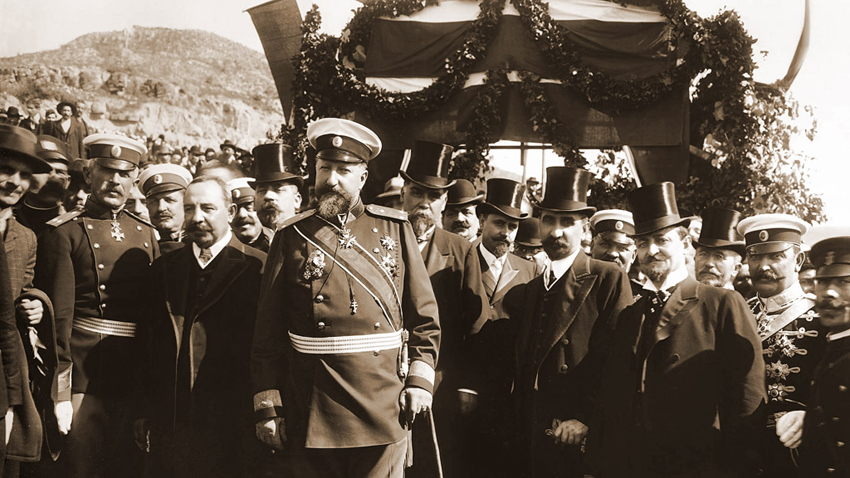Bulgaria's Liberation from five centuries of Ottoman domination came on March 3, 1878 after the Russo-Turkish War, but recognition of its independence was a long process and all post-liberation governments worked for this. Tsar Ferdinand I declared Bulgarian independence on September 22, 1908. After complex negotiations on April 6, 1909 Bulgaria's independence was recognized by the Sublime Porte. "Under the Treaty of Berlin of July 1878, the Principality of Bulgaria was a vassal of the Ottoman Empire, and the prince is a vassal to the overlord. Bulgaria was still dependent in legal terms. It had no right to sign international agreements," historian Acad. Georgi Markov says:
"It took 30 years of looking for favourable international conditions to overcome these legal clauses. This happened in the summer of 1908, when Midhat Pasha took power. For some this is the Young Turk Revolution, for others it is a Young Turk coup. Bulgaria, in the face of Prime Minister Alexander Malinov took advantage of the raging Balkan crisis. At the same period Austria-Hungary in violation of the Treaty of Berlin, decided to annex Bosnia and Herzegovina. Thus the wrath of the other Great Powers fell more on Vienna rather than on Sofia.”

How did the Great Powers and the Sublime Porte react to the independence of Bulgaria?
"The Sublime Porte was against the violation of the Berlin Treaty. But it wanted financial compensation for the Bulgarian independence. It called for 600 million gold francs but negotiator Andrei Lyapchev managed to bring down the price to 82 million. Russia was the one to react most sharply. Nicholas II suspected that there was a secret agreement between Ferdinand and the Emperor of Austria-Hungary Franz Joseph to the detriment of Russian interests. Britain was the balancing power between Austria-Hungary and Russia at that moment. "
There was partial mobilization of the Bulgarian Army. What gave Bulgaria confidence that it could cope in the event of a military conflict?
"After the suppression of the Ilinden uprising in against the Ottoman Empire in 1903 starts fast repositioning of the Bulgarian army started and it was armed with modern weapons according to the plans by Defence Minister General. Mihail Savov. The first operational plan for offensive against the Ottoman Empire combined with uprising in Macedonia and the region of Edirne Thrace was created. There was also cooperation between the Bulgarian Government and the Internal Macedonian Revolutionary Organization. Moreover, Malinov hoped that Romania would not intervene in the crisis because of the military convention between Bulgaria and Russia from 1902, in which Russia was obliged to help Bulgaria with military means in case of an attack from Romania. Serbia was threatened by Austro-Hungary. Its army was focused on Bosnia and Herzegovina, as Belgrade considers these lands being Serbian. Bulgarian Eighth Tundzha Division was focused on the Edirne province and occupied positions on the border. Then the Russian emperor interfered. Russia had not yet recovered after its defeat in the war against Japan and did not want to be involved in another military conflict in the Balkans. Emperor Nicholas II became an intermediary in the negotiations between Bulgaria and the Ottoman Empire. After Andrew Lyapchev reduced the size of the requested compensation Russia said it would take the money as part of the military compensations from the Ottomans after the Russo-Turkish War. Bulgaria was granted a low-interest loan of 82 million gold francs, payable over 30 years and this was the financial settlement of the matters.”
Did Bulgaria pay this debt to Russia?
"No. The Bolshevik Revolution cancelled that debt. Bulgaria paid some 2 million gold francs before that but in 1915 Bulgaria interfered in the First World War, by attacking Serbia. Paying of debts stopped. And in 1917, Lenin declared that Soviet Russia will not pay its debts to France and England, but will not seek money from loans that the Russian Empire gave. "
What were the changes to Bulgaria after the Independence?
"Bulgaria received the right to enter into political and military alliances. It bought the Eastern Railways, built in southern Bulgaria during the times of the Ottoman Empire, thus gaining property on the entire rail network on its territory. The power of the Bulgarian state increased and it became a factor in Southeast Europe. The prince was declared king."
English: Alexander MarkovThe findings from the archaeological excavations of Kozareva mound - a settlement from the 5th millennium BC , became a real sensation already in 2014, when they were presented to the general public for the first time. Among the exquisite exhibits of..
On September 6, 1885, Bulgaria again became a unified state. In an interview with Radio Bulgaria, history professor from Sofia University "St. Kliment Ohridski" Ivan Ilchev tells us more about the factors that led to the Unification, when the..
For Bulgarians, who cherish and honour the memory of their ancestors, 6 September symbolises the unification of their nation, which endured five centuries of Ottoman oppression while preserving its faith and identity. After the liberation of Bulgaria..
Today, 6 November, marks 104 years since the annexation of the Western Outlands in 1920. Traditionally Bulgarian territories in south-eastern Serbia and..
The Days of Croatian Archaeological Heritage, which will last until 8 November, begin today at the National Archaeological Institute with Museum at the..

+359 2 9336 661
